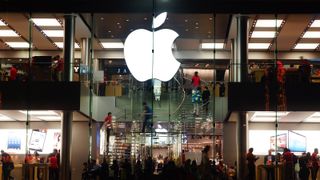Paradise Papers: Apple drawn into tax haven scandal
The Paradise Papers contain a massive trove of documents showing offshore empires of tech firms

Apple is the latest company to be drawn into the fallout from the Paradise Papers. Leaked documents show that the company, in the wake of being asked to pay $14.5 billion in back taxes to the EU, looked to move $250 billion from its Irish subsidiaries to other offshore jurisdictions with more gentle taxation arrangements.
The documents show that Apple asked corporate services provider and law firm Appleby to investigate the pros and cons of the British Virgin Islands, Bermuda, the Cayman Islands, Mauritius, the Isle of Man, Jersey and Guernsey. The company ultimately moved its wealth to Jersey, which happened to (for the most part) end corporate taxation in 2008.
If this money were kept within the United States, where Apple is based, the company would be paying a rate of 35% tax on those profits, which would seriously help the country's finances.
Apple has issued a statement defending its tax arrangements, and these broadly come back to one accurate point: the company acted according to the letter of the law: "At Apple we follow the laws, and if the system changes we will comply," the company wrote in a statement.
"The debate over Apple's taxes is not about how much we owe but where we owe it," said a spokesperson for the company. "As the largest taxpayer in the world we've paid over $35 billion in corporate income taxes over the past three years, plus billions of dollars more in property tax, payroll tax, sales tax and VAT. We believe every company has a responsibility to pay the taxes they owe and we're proud of the economic contributions we make to the countries and communities where we do business.
"Under the current international tax system, profits are taxed based on where the value is created. The taxes Apple pays to countries around the world are based on that principle. The vast majority of the value in our products is indisputably created in the United States - where we do our design, development, engineering work and much more - so the majority of our taxes are owed to the US.
"When Ireland changed its tax laws in 2015, we complied by changing the residency of our Irish subsidiaries and we informed Ireland, the European Commission and the United States. The changes we made did not reduce our tax payments in any country. In fact, our payments to Ireland increased significantly and over the last three years we've paid $1.5 billion in tax there - 7% of all corporate income taxes paid in that country. Our changes also ensured that our tax obligation to the United States was not reduced."
Get the ITPro. daily newsletter
Receive our latest news, industry updates, featured resources and more. Sign up today to receive our FREE report on AI cyber crime & security - newly updated for 2024.
The company spokesperson closed their statement by expressing that Apple would welcome global action to reform the way tax is collected. "We strongly support efforts from the global community toward comprehensive international tax reform and a far simpler system, and we will continue to advocate for that."
For a quick explainer on the Paradise Papers, keep reading.
The Paradise Papers: What are they?
The Paradise Papers contain a massive trove of documents, compiled of 13.4 million files showing offshore empires involving tech firms like Facebook, Twitter, Uber and Apple. Used by large organisations to use tax loopholes, the Paradise Papers expose the unscrupulous (although not illegal) dealings by multinational corporations. A total 6.8 million of these files relate to Appleby, a corporate services provider and law firm.
The Paradise Papers: What happened and what do they reveal?
On Sunday, files leaked to German newspaper, Suddeutsche Zeitung, were released. This was the same newspaper that revealed the Panama Papers back in April last year. After sharing the material with the International Consortium of Investigative Journalists, the group was able to coordinate the investigation of the data.
The data in the papers cover the period from 1950 all the way to 2016. There are around 25,000 offshore companies and more than 120,000 names linked with Appleby, revealing the most popular tax havens as the Cayman Islands and Bermuda.
The files expose the ways in which giant companies use loopholes in structures in tax havens.
The most notable finding from the Paradise Papers is the discovery that Yuri Milner, a billionaire investor who owns more than 8% of Facebook and 5% of Twitter, has investments worth hundreds of millions of dollars with backing from the Kremlin. The papers also reveal that the money invested into Twitter has been backed by Russian state-controlled bank VTB, notorious for the making of political deals.
Last year, the Panama Papers exposed how a VTB-owned bank in Cyprus was the bank used to funnel hundreds of millions of pounds to Putin's associate, Sergei Roldugin. The papers showed how VTB has been a facilitator used in exchanges between Russia and huge multinational tech companies for many years.
Back in 2011, VTB made investments of $191 million in DST, a company in the Isle of Man. Half of DST Global's investments in Twitter that month were from VTB.
The Paradise Papers: Why should you care?
The Paradise Papers gives insight into the investigations behind the supposed interference by the Russian government during the 2016 US election. Analysts are suggesting that the papers could reveal how Milner's Kremlin-backed investments could have links to fake news stories, political adverts and pro-Trump rhetoric prominent on Facebook - although this is purely speculation at this time.
Picture: Bigstock
After a false career start producing flash games, Alan Martin has been writing about phones, wearables and internet culture for over a decade with bylines all over the web and print.
Previously Deputy Editor of Alphr, he turned freelance in 2018 and his words can now be found all over the web, on the likes of Tom's Guide, The i, TechRadar, NME, Gizmodo, Coach, T3, The New Statesman and ShortList, as well as in the odd magazine and newspaper.
He's rarely seen not wearing at least one smartwatch, can talk your ear off about political biographies, and is a long-suffering fan of Derby County FC (which, on balance, he'd rather not talk about). He lives in London, right at the bottom of the Northern Line, long after you think it ends.
You can find Alan tweeting at @alan_p_martin, or email him at mralanpmartin@gmail.com.





